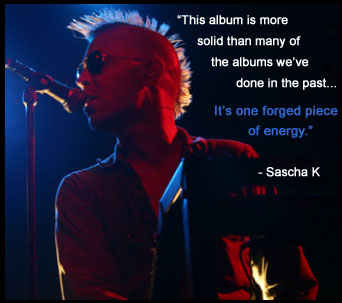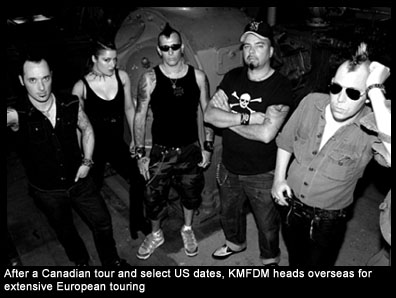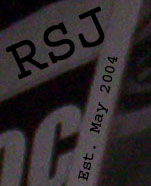|
KMFDM has been in the business of providing the ultra heavy beat for the past 21 years. They've been in the business of being
a band for a considerably shorter period of time. A longtime revolving door of musicians and guests headed up by originator
Sascha K, KMFDM has only recently developed a solid line-up. It is from this line-up that "Hau Ruck" springs forth,
a new chapter in KMFDM's ever-evolving history. Never afraid of the controversial, the band's founder speaks about the latest
release from this politically-charged musical collective. Ladies and gentlemen, Sascha K...
Rock Star Journalism: Why did you decide to go back to Metropolis for this release?
Sascha K: We always need a bit of money to be bankrolled for the time that we record an album cause we basically live
from our hands to our mouths; we have no money set aside to sustain us for however long recording an album takes. Metropolis
agreed to do it as a joint venture -- strictly speaking, the record is on Metropolis and KMFDM Records.
RSJ: Do you plan to put anyone else's work out through KMFDM Records?
SK: At this point, no. About a year ago, Raymond [Watts] solo project, Pigmartyr, should have come out here, but he got
some pretty bad advice from people back in England and they convinced him to go with their label. Then they totally botched
the release. That's the way I've seen it go a lot of times. And I really don't have enough time in my day to help other
people out in that sort of respect. KMFDM really takes up our entire time.
RSJ: Were you satisfied with last year's 20th anniversary tour overall?
SK: I was more than satisfied, actually. It was the best tour we've ever done. We went to places like Russia and Australia
where few ever tour, and we had never been.
RSJ: The setlist for that tour included a lot of older material. Was that a farewell to playing many of those songs live?
SK: It was a farewell for the time being. Our current setlist for this upcoming tour is completely different. It's,
of course, a good portion of the new stuff; then, we've mixed up the other stuff as well. So, we're playing stuff that we've
either never played or haven't played in at least ten years. Songs like "Son of a Gun," "Inane" -- nothing
off Xtort was ever performed live, other than "Rules." Actually, we're playing "Terror" again, which
we only played in 1995, probably "Search & Destroy" also -- so it's gonna be a good mix. I think out of 19
or 20 songs we're gonna be playing, there's 15 or 16 new ones.
RSJ: Why did you choose not to release a live recording of this tour, considering the previous two tours had live cds?
SK: The fact that they released [previous live cds] -- that was label politics that I really don't agree with. I mean,
if you have the dvd, why do you need a cd? I thought that was a little heavy-handed to offer both, and then mix it up with
only one track difference -- that was kind of shit. But [former label] Sanctuary was really shit.
RSJ: You made some changes to your recording equipment for the new album. How do you think using the analog devices was
beneficial?
SK: I'm definitely one of those old-school analog synth tech-heads, and I was missing the tweakage. There was a couple
boxes sitting around in our respective studios, and I never got the knack of them really -- Korg Triton stuff and whatnot.
When you have a machine with presets and beats and all, pre-programmed stuff -- I don't get into that at all. So, I decided
since I have only limited amounts of space in my studio, let's get rid of all the crap and put the nice boxes back in. So,
it was real fun -- way more intuitive to play.
RSJ: In the liner notes, you mention setting up recording studios for each band member. Why did you choose to record
in this way?
SK: Just because it's the most time-effective and cost-effective way -- to not spend a lot of time in one room all together,
basically four people watching what one person does. So, everybody had their little world and could work totally undisturbed.
It really put the fact that we're five people in a band to the most use.
 RSJ: With the exception of Raymond Watts not being on this release, there has been a fairly stable line up for the past few
albums. Has having the same people made it easier to write with specific musicians in mind?
SK: It makes it more interesting for me to really explore what people that I know and appreciate can put out than to follow
the old KMFDM approach, where it was more or less the same thing a band like Pigface would do -- no real [band members] and
it's a revolving door kind of thing. It's too superficial that way, and I really like to incorporate my bandmates into the
making of the record. I tried to for a long time, but it was always very difficult, and now I consider myself lucky enough
to have found a stable line-up of people that get along with each other really well and are also really high end musicians.
That, to me, is more important than to be a name-dropper and say, "oh, I got so-and-so on one song." It just takes
away from the validity I believe. I feel that this album is more solid than many of the albums we've done in the past just
cause it's one forged piece of energy.
RSJ: When you were first discussing this album, there was a mention of the possibility of shooting a video. Do you still
plan to do that?
SK: No, we ditched that idea. We sat down and thought, who would we be shooting the video for? We don't want to be played
on MTV, so ultimately we'd be blowing out $10,000 just to get the video played in industrial clubs. It's just not worth it.
We are looking at putting together a group of remixes off the new album for release early next year. That could be a
nice thing to do, and it would definitely be a good idea to have a release if and when we do a US tour next year.
RSJ: Some of the more electronic tracks almost seem to be a little reminiscent of your Excessive Force work. Did you
want to get back into more of that kind of programming with this album?
SK: No, there wasn't really the desire to go back in any way. I guess what you're hearing is just my musical signature,
my handwriting.
RSJ: One of the tracks is a cover of Jacques Dutronc's "Mini Mini Mini." Since KMFDM has only done a handful
of covers, what made you want to record this song?
SK: Since I was a nine-year-old boy, that's been one of my favorite songs. I had a reel-to-reel machine, and on Saturday
afternoons my brother and I just recorded stuff off the BBC Hit Parade; we captured that song. And now, every time I go home
to Germany and I fish around in my mom's attic I find a reel-to-reel, and that tape is always in that thing. So, I figured
it would be great to do a song in French, and initially I had another one in mind to cover, but that one was just a little
too demanding in terms of vocal craftsmanship. So, I figured, hey, let's just do "Mini Mini Mini" -- my favorite
song of all time! (laughs)
RSJ: This is the first release in awhile to feature several tracks sung in German. What led to writing songs like "Hau
Ruck" and "Auf Weiderseh'n"?
SK: This time around, no guest musicians meant that there was much more of a workload for Lucia and I to take care of.
And my native language is German, so it's more natural to just write in German for me.
 RSJ: In a recent radio interview, you answered a question about "Feed Our Fame" dealing with internet rumors. So,
obviously you're aware of the misinformation that sometimes gets spread this way --
SK: Yeah, absolutely, it's totally about all those knuckleheads on these chat groups -- the people that know it all and
can do it all better. I stopped checking in on those things a long time ago; it's such a waste of my time, really.
RSJ: Do you think anything can be gained from these forums?
SK: I wouldn't look at it as gaining anything or losing anything. Some people make music and some people have lots of
time on their hands to sit in front of the computer and spread rumors and voice their opinions. I think it's a great outlet
for people, and it could even be therapeutic in a certain sense, but it's nothing that I care to interact with. I have ways
to interact with the KMFDM fanbase that are way more efficient. We all make ourselves available before and after the shows
-- I think we're definitely one of the more approachable bands that are out there.
RSJ: Speaking of the message boards, you got into a conflict with someone who was trying to distribute bootleg Pig material
on a board. Are you completely against people sharing this kind of material, or was the issue more with the way this person
was doing it?
SK: I'm not against sharing at all. The fact is really simple -- a great part of Raymond's publishing catalog lies with
my company, KMFDM Enterprises. There's contracts between Raymond and my company, and we are legally bound to control bootlegging
as well as we can. This guy was just so blatantly stupid to just post it that it was found out about. And we were notified
about it, and someone did something about it. Probably not too effective, I'm sure they do it behind the scenes -- which
is fine. Just don't rub it in our faces. This is our job; we have Raymond's best interest in mind when we do something like
that.
RSJ: You're going to have a very brief US tour this year before heading overseas. When will the rest of the US dates
start next year?
SK: We won't be back here until early next year. Then there's talk about Australia early on, and if it looks like a good
business venture, then maybe we'll do a US tour. But we've toured the US in 2002 through 2004, and now we're covering our
main markets again. So, I don't know. If it looks right and feels right we'll do a tour next year, if not then we will skip
it. We're also going to be playing a lot of European festivals next summer, so the window is getting smaller and smaller
by the day.
RSJ: In other interviews we've conducted recently, artists have mentioned being frustrated that there's not more dissent
in the musical community, considering the current political climate. Is this something you've been bothered by as well?
SK: Yeah, I think that's really super disappointing, but it's a sign of the times. It just goes to show how deeply scared
they have us. Nobody wants to stick out like a sore thumb as a dissenter at this point. We're weighing our options to perhaps
relocate to Europe for a couple years and just kick up the shit over there. Hence this very extensive European tour that's
gonna lay the foundation for next year's summer touring. I've always loved it in Europe, and they've always treated us very
good there as well, so we'll see what happens.
RSJ: KMFDM was a sponsor of the Opticlash VJ battle this year. How did you get involved with that?
SK: Jacob, our videographer and projectionist, he just drummed up this VJ battle in Seattle. Proceeds of it were going
to the food bank, and we thought it would be a good thing to endorse.
RSJ: What did you think of the event?
SK: I thought it was fantastic. There was so much radical creativity in one small room, it was breathtaking.
RSJ: Over the years, you've been able to put out KMFDM albums on a regular basis. Why do you think you've been able to
do this so consistently, when that isn't the case for a lot of bands?
SK: I don't know if that's the right way to describe it, that it's not the case for other bands. I think everybody can
make choices, and we just chose to be prolific and to, in a way, spoil our fans with constant snapshots of our evolution.
And surely you might say, maybe if they had taken twice the time and not released something for three years, it would have
been that one stellar album that everybody's always waiting for. But we just choose to put out stuff. We're full of ideas,
we're full of creativity again; it's just the way we like to do things. If I sit at home and do nothing -- if I have no tours
coming up or no records to work on -- I'm just gonna shrivel up and die.
For more info on KMFDM, check out our previous feature here
Got something to say about this feature? E-mail us.
|

